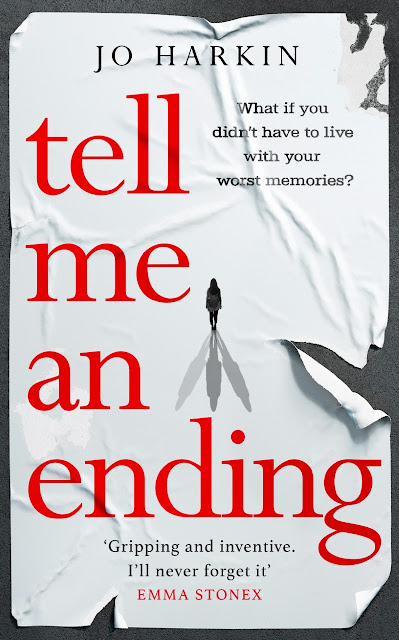Across the world, thousands of people are shocked to receive an email telling them that they once chose to have a traumatic memory removed. Now they are being given the chance to get that memory back.
For Mei, William, Oscar and Finn there is a piece missing, but they're not sure what. And each of them must decide if the truth is worth the pain, or better left unknown.
For Noor, who works at the memory clinic Nepenthe, the process of reinstating their patients' memories begins to shake the moral foundations of her world. As she delves deeper into the programme, she will have to risk everything to uncover the true human cost of this miraculous technology.
An exploration of secrets, grief, identity and belonging - of the stories we tell ourselves, and come to rely on, Tell Me An Ending is a sharp, dark and devastating novel about the power and danger of memory.
It's my pleasure to be hosting the blog tour for Tell Me An Ending today. Many thanks to Jo Harkin, Hutchinson Heinemann and Anne Cater from Random Things Tours for inviting me and for sending me a copy of the novel.
Tell Me An Ending is set in an alternative time so close to our own that it's not really possible to call it near-future. People still travel in cars and on planes, use mobile phones and buy their lunch from Pret. In fact, the only discernible difference is that for some time, people have been able to go to a memory clinic, Nepenthe, to have traumatic memories removed. Now, if somebody witnesses a tragic accident, has an affair they'd rather forget or make a mistake they want to erase, they can undergo a relatively simple procedure to ensure it's wiped from their mind. It's an tantalising premise but Jo Harkin acknowledges that it's nothing new; comparisons to Eternal Sunshine of the Spotless Mind are inevitable (and it's referenced within the book) but it's also noted that Haydn's Orlando Paladino is about the successful removal of a person's memory, while the name Nepenthe is taken from a potion used by Helen of Troy in the Odyssey.
Of course, great technological advancements, particularly those that interfere with the human body and mind are often later found to not be perhaps a magic cure-all after all and now it has been discovered that memories haven't been permanently removed. Some people experience what has become known as 'traces' – confusing glimpses of the past life they wanted to forget. Nepenthe gives clients two options when it comes to their procedure; the self-informed know they've had a memory removed, the self-confidential don't. Now negative media coverage, protests and most persuasively, class-action lawsuits, means that people have the right to not only be informed that they were former self-confidential clients but also to have those memories restored.
The storyline follows a number of characters affected by this development. Noor works at Nepenthe and strongly believes in her boss and mentor, Louise's philosophy of 'Do Least Harm'. The messy ending of a relationship still troubles her but when she begins to suspect that there are secrets that those in charge are determined to stop coming to light, she has to decide whether to confront all she trusted and risk her career. Finn, William, Mei and Oscar must consider what they want to do with the knowledge that is unexpectedly imparted to them. I suspect that Tell Me An Ending will be a rather divisive novel, with some readers put off by the structure of the narrative that sees each of the character's stories followed separately for much of the book – although they inevitably become loosely interlinked as the plot progresses. However, I became invested in them all and although I would have undoubtedly enjoyed a book that concentrated on perhaps just one or two of the main characters, I loved the thought-provoking exploration of how such life-changing news would impact on different people's lives.
Oscar's story is arguably the most fascinating; he is in Marrakesh but is clearly not settled and his tormented doubts as to the sort of person he really is and why he fears being discovered living there are compulsively intriguing and deeply moving. Meanwhile, William is a former Chief Inspector whose inability to open up to his wife about his PTSD is as much a threat to his marriage as the photo that led to the end of his career, Finn becomes increasingly anxious wondering what his wife, Mirande chose to forget and why, and Mei begins to question all that she's believed about herself after she goes to Amsterdam to see if she can find any meaning behind her vague memories of colourful houses and a man's voice discussing bold moves.
Each story is beautifully conceived and separately moving; this is a story of love and loss, guilt and forgiveness. It's about the courage to remember or the resolve to move on and as the characters reflect on what knowing or not will mean for them, Tell Me An Ending examines deep philosophical questions about choice, self and identity. It's a book that allows its revelations to unfold gradually but is so engrossing that I was unable to put it down as I raced through the pages both in order to find out the truth about Nepenthe and to learn what each character would ultimately do. Tell Me An Ending is a complex, cleverly nuanced novel that examines moral, ethical and emotional issues with perceptiveness and compassion. I highly recommend it.
Tell Me An Ending is published by Hutchinson Heinemann, purchasing links can be found here but please consider supporting independent bookshops whenever possible.
Follow the blog tour, details are below.
About the Author
Jo Harkin studied English literature at university. She daydreamed her way through various jobs in her twenties before giving in and becoming a full-time writer. She lives in Berkshire.




Comments
Post a Comment